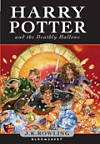
Could the UK government’s response to the terrorist threat since 9/11 be the basis of plots and story lines in the Harry Potter series of books? Judith Rauhofer of the University of Central Lancashire believes so and has carried out a study of JK Rowling’s fictional accounts of the exploits of the child wizard with the infamous scar. She has found several subtle parallels in the books written since September 11, 2001, with contemporary society and suggests that the allegorical nature of these novels could underpin much of their appeal to adult readers.
Since the publication of the fourth book, “Harry Potter and the Goblet of Fire”, the publishers, Bloomsbury, has acknowledged that a large part of the readership is among adults, by publishing an adult edition alongside the children’s version. Many commentators suspect that one possible rationale for this is to allow adults to read the book in public without embarrassment.
Jon Howells of Waterstone’s told me that, “Based on our pre-order statistics we estimate that some 45 per cent of Harry Potter book 7 sales will be of the adult edition, which is up on about 23 per cent for the last book.” Book 7 – Harry Potter and the Deathly Hallows – goes on sale Saturday 21st July.
According to Rauhofer, book five in the series was the first Harry Potter book to be written entirely after the terrorist attacks in New York City, Pennsylvania, and Washington. “Until then, the Harry Potter series could be seen as nothing more than a simple story of good versus evil,” says Rauhofer. But, after that, “JK Rowling’s work evolved into more of a social commentary on current events.”
Rauhofer believes that with the Harry Potter series Rowling has created a parallel world highlighting many of the steps taken by the British government, which she says are mostly unfair and unjustifiable, in the name of the war on terror. For instance, in the fifth book, “Harry Potter and the Order of the Phoenix”, all wizards are issued with emergency pamphlets. “Most people who received the UK government’s ‘Preparing for an-emergency’ pamphlet through their letterbox in 2004 will recognise the irony of Rowling’s plot detail here,” says Rauhofer.
Several key plot features hint at parallels between the wizard world and the so-called “muggle” world of humans, says Rauhofer. The marginalising of an ethnic group, for instance, by the muggles themselves, identity issues with Death Eaters masquerading as others, detention without trial of Knight Bus conductor Stanley Shunpike on suspicion of Death Eater activity, interception of Arthur and Molly’s post while in The Burrow in the name of safety, and many other examples.
“Rowling’s description of an alternative society and its government traces recent events in contemporary society,” Rauhofer adds, “The political thread going through the series largely focuses on the way in which the Ministry of Magic deals with Lord Voldemort’s return.” If Voldemort, whom of course should not be named, is the terrorist threat in disguise, then the anti-Voldemort security measures taken by the Wizards could be seen to reflect various legal and political changes that have occurred in the UK since 9/11.
Of course, it could simply be that, like countless books before it, readers find ways of looking between the lines to see hidden messages that are simply not there. Unfortunately, JK Rowling is rather busy this week and was unavailable for comment at the time of writing.
Rauhofer’s treatise appears in